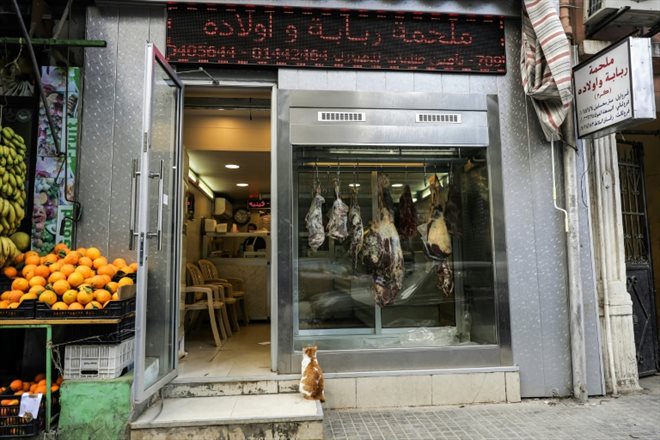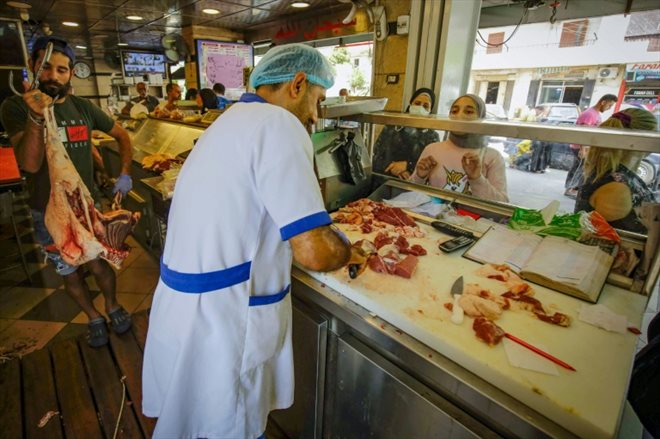In a butcher shop in Tripoli, Lebanon, January 26, 2021 (AFP/Archives/JOSEPH EID)
Layla Ibrahim has chosen to drastically reduce her meat consumption, not out of a desire to become a vegetarian, but because of soaring prices in a Lebanon in the midst of an economic crisis.
“I used to eat red meat, chicken or fish every day…but the price of those foods became exorbitant,” Ibrahim, 44, told AFP.
“We reduced our consumption of red meat to once a week, in practice I almost became a vegetarian,” she adds.
Lebanon has been in the grip of an unprecedented economic crisis since 2019, described by the World Bank as one of the worst in modern history.
The local currency has lost nearly 90% of its value and the monthly minimum wage, of 675,000 Lebanese pounds, is hardly worth more than 30 dollars (about 27 euros) on the black market.
Around 80% of the population in Lebanon now lives below the UN poverty line.
Against the backdrop of galloping inflation, Australian and South American red meat prices have increased more than fivefold.
“We eat small amounts of minced meat in stuffings or stews,” says Ms. Ibrahim. “Even the Sunday family barbecue has been canceled,” regrets this mother of two children.
The Lebanese must therefore find a substitute for red meat, the main food of many Lebanese dishes.
– Substitution –
“Consumers are replacing red meat with cheaper alternatives, such as chicken or legumes,” said Nabil Fahed, president of the union of supermarket owners in Lebanon.
The average price of a kilogram of chicken is 120,000 Lebanese pounds (about 4.5 euros) and that of a fillet of beef costs about 300,000 pounds (about 13.7 euros), almost half the monthly minimum wage.

A butcher shop in Beirut in January 2019, Lebanon (AFP/Archives/Joseph EID)
After the lifting of subsidies on some imported foods, demand for red meat fell, Fahed said, with sales in supermarkets even falling by around 70%.
This trend is even more important in popular markets and small businesses frequented by people with modest incomes, notes Mr. Fahed.
And due to increases in the price of electricity, the cost of storage continues to rise. Importers must subscribe to private generators to keep refrigerators running, which affects demand for meat.
The Lebanese government is struggling to fund the import of fuel needed to power its power plants, with outages exceeding 22 hours a day in most areas.
– “Imported in dollars” –
According to Imad Harrouk, director of Fed Distribution, a meat importing company, many consumers now buy meat as needed.
“Even those who can afford it don’t buy as much as they used to,” he adds.
The growing aversion to meat has also hit restaurants, which have lost their core, middle-class customers, according to restaurant union president Tony Al-Rami.

A butcher shop in Tripoli, Lebanon, in July 2020 (AFP/Archives/IBRAHIM CHALHOUB)
“Only 5% of people can afford to keep the same consumption habit as before,” Al-Rami told AFP.
On the fast food side, the red meat of the “shawarma” sandwich – the Arabic equivalent of the kebab – has been shunned in favor of chicken, which is cheaper, according to him.
“The economic crisis as well as the Covid-19 health crisis have led to a drastic drop in sales on the entire menu, especially dishes with meat,” said Hala Jebai, director of the customer service department at Kababji, renowned in the world. Lebanon for its kebabs.
“The price of the meat we offer has become very high (…) because we import it and pay for it in dollars,” she adds.
“The butchers only slaughter one calf a day, instead of two or three,” explains Nancy Awada, a food inspector working for the municipality of Beirut.
As an indirect consequence of this trend, despite the lack of improvement in sanitary conditions, “the number of complaints relating to the quality of the meat has decreased by 75%”, adds Ms. Awada.
© 2022 AFP
Did you like this article ? Share it with your friends with the buttons below.




